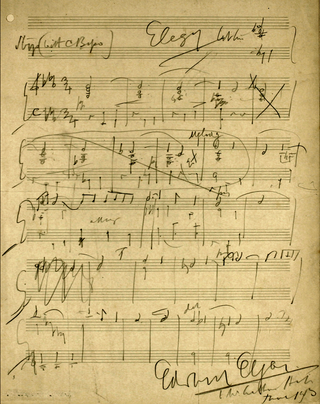
Sir Edward William Elgar, 1st Baronet, was an English composer, many of whose works have entered the British and international classical concert repertoire. Among his best-known compositions are orchestral works including the Enigma Variations, the Pomp and Circumstance Marches, concertos for violin and cello, and two symphonies. He also composed choral works, including The Dream of Gerontius, chamber music and songs. He was appointed Master of the King's Musick in 1924.
The Pomp and Circumstance Marches are a series of five marches for orchestra composed by Edward Elgar, together with a sixth march created from sketches. The marches were dedicated to his friends including composer Granville Bantock and organists George Robertson Sinclair, Ivor Atkins and Percy Hull.
Master of the King's Music is a post in the Royal Household of the United Kingdom. The holder of the post originally served the monarch of England, directing the court orchestra and composing or commissioning music as required.

Edward Elgar's Violin Concerto in B minor, Op. 61, is one of his longest orchestral compositions, and the last of his works to gain immediate popular success.

The Sonata in G major, Op. 28 is Edward Elgar's only sonata composed for the organ and was first performed on 8 July 1895. It also exists in arrangements for full orchestra made after Elgar's death.

The Pursuit of Diarmuid and Gráinne is an Irish prose narrative surviving in many variants. A tale from the Fianna Cycle of Irish mythology, it concerns a love triangle between the great warrior Fionn mac Cumhaill, the beautiful princess Gráinne, and her paramour Diarmuid Ua Duibhne. Surviving texts are all in Modern Irish and the earliest dates to the 16th century, but some elements of the material date as far back as the 10th century.
The Serenade for String Orchestra in E minor, Op. 20, is an early piece in three short movements, by Edward Elgar. It was written in March 1892 and first performed privately in that year; its public premiere was in 1896. It became one of Elgar's most popular compositions, and has been recorded many times.
The Crown of India, was a masque, an elaborate theatrical presentation, staged in 1912 to celebrate the visit the preceding December of King George V and Queen Mary to Delhi for their coronation as Emperor and Empress of India. For this masque, the English composer Sir Edward Elgar wrote the music as his Op. 66, with a libretto by Henry Hamilton. The masque consisted of two tableaux: "The Cities of Ind" and "Ave Imperator!".
”There are seven that pull the thread” is a song with words by W. B. Yeats, and music written by the English composer Edward Elgar in 1901.

"A War Song", originally called "A Soldier's Song", was a poem written by C. Flavell Hayward and set to music by the English composer Edward Elgar in 1884.
"Follow the Colours" is a marching song written by the English composer Edward Elgar in 1907, with words by Capt. William de Courcy Stretton. The song is for male voice solo with an optional male voice chorus, accompanied by piano, orchestra or military band.
Une voix dans le désert("A Voice in the Desert") is a recitation, with a soprano soloist and orchestra, written by the English composer Edward Elgar in 1915 as his Op. 77. The French words are by the Belgian poet Émile Cammaerts.
Polonia is a symphonic prelude by the English composer Edward Elgar written in 1915 as his Op. 76.
William Henry Reed MVO was an English violinist, teacher, composer, conductor and biographer of Edward Elgar. He was leader of the London Symphony Orchestra for 23 years (1912–1935), but is best known for his long personal friendship with Elgar (1910–1934) and his book Elgar As I Knew Him (1936), in which he goes into great detail about the genesis of the Violin Concerto in B minor.

Caroline Alice, Lady Elgar was an English author of verse and prose fiction, who married the composer Edward Elgar.
The String Quartet in E minor, Op. 83, was one of three major chamber music works composed by Sir Edward Elgar in 1918. The others were the Violin Sonata in E minor, Op. 82, and the Piano Quintet in A minor, Op. 84. Along with the Cello Concerto in E minor, Op. 85 of 1919, these were to be his last major works prior to his death in 1934.

From the Bavarian Highlands, Op 27 is a work for choir and orchestra by Edward Elgar.
This is a summary of 1902 in music in the United Kingdom.

Elegy, Op. 58 is a short piece for string orchestra by Edward Elgar, composed in 1909. It was written in response to a request for a short piece to commemorate deceased members of the Worshipful Company of Musicians. The work was composed within a month of the death of his close friend August Jaeger and may reflect Elgar's grief at his loss.







